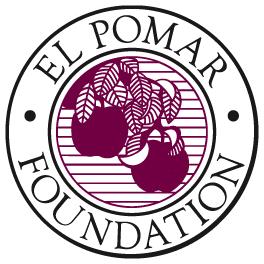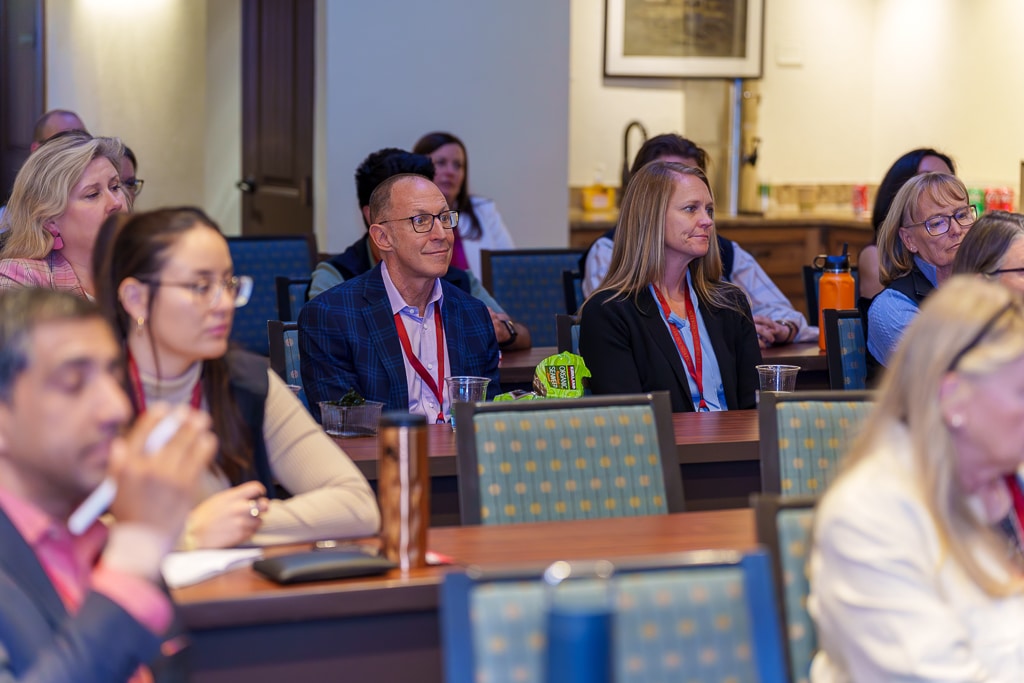El Pomar’s Statewide Meeting brings together more than 70 local leaders, each serving on one of the Foundation’s 11 regional councils, along with philanthropic leaders and community partners from across Colorado. Through regional council meetings, Foundation updates, and discussions on key issues facing local communities, the Statewide Meeting provides a space for changemakers to learn, connect, and collaborate to enhance their communities. The event concludes with the Foundation’s Night of Excellence, which is an opportunity to celebrate outstanding organizations and individuals around the state.
Each year, the event’s General Session highlights content relevant across Colorado communities. This year’s discussion highlighted indicators for Colorado’s economic health and offered opportunities for deeper discussion on the issues of childcare, housing, and workforce.
The Economic Health of Colorado Communities
To offer insights and expertise, El Pomar Foundation invited Dr. Tatiana Bailey to discuss the health of Colorado’s economy through national, statewide, and local data. Dr. Bailey is the founder and executive director of Data-Driven Economic Strategies, a nonprofit organization focused on unbiased monthly economic reporting and workforce development initiatives particularly for underserved communities. In her analysis, Dr. Bailey discussed how U.S. economic trends compare to Colorado, taking note that labor participation rates, remote work, migration patterns, and artificial intelligence are influencing various industries across the state. Highlighting Colorado’s strengths, she noted that the state is ranked as the second most educated in the nation, contributing to a high labor participation rate. After Dr. Bailey’s remarks, participants attended breakout sessions that dove deeper into three topics interconnected with each other and the larger question of economic health: childcare, workforce development, and housing.
Childcare & Early Childhood Development
Affordability and access to childcare and high-quality early childhood education is a growing crisis impacting families and the Colorado workforce. Panelists Liz Denson, President & CEO of Early Connections Learning Centers; Jamie Giacomini, Director of Adult and Community Education at Northeastern Junior College (NJC); Sara Mordecai, Executive Director of Silverton Family Learning Center; and Nicole Riehl, President & CEO of Executives Partnering to Invest in Children, engaged in a discussion of the challenges and opportunities in this area.
The panel highlighted critical childcare statistics including the shortage of over 80,000 childcare slots across Colorado, and that the average family spends approximately a quarter of their income on childcare, if not more. The sources of these dilemmas vary, including teacher recruitment and retention issues due to non-competitive wages, and the limited and expensive nature of in-home childcare in rural areas for both parents and providers. The high costs associated with providing quality childcare and the inherent shortfall of tuition revenue is a significant challenge for providers in paying for operational and overhead costs. Some prospects for growth included developing unique partnerships, such as Sunshine Child Care’s rent-free facility on NJC’s campus, which provides college students with on-the-job training and experience. Additionally, the utilization of lodging taxes and refundable tax credits was suggested as another avenue to support childcare centers and their teachers long-term.
Workforce Readiness & Development
Another key indicator of a community’s health is its access to and the quality of its workforce. Panelists Landon Mascareñez, State Board Chair of Colorado Community College Systems; Reece Blincoe, Superintendent of East Otero School District; Gabrielle Glassford, Associate Director of Workforce Development at Data-Driven Economic Strategies; and Helen Young Hayes, CEO of ActivateWork, participated in a panel discussion on workforce topics.
The panel highlighted the skills gap in the Colorado workforce noting that nearly 91 percent of all jobs require post-secondary education or certifications while only approximately one-third of Coloradans possess those credentials. Additionally, panelists discussed the impacts of artificial intelligence on the workforce with more than half of workplace tasks projected to be replaced with this technology. Key solutions included improving workforce readiness and development through community partnerships, supporting community college and vocational credential programs to provide more affordable options for individuals to learn key skills, and emphasizing the value of apprenticeships and mentorships in offering workers paid training and experience.
Attainable & Affordable Housing
Another significant challenge faced by large and small communities across Colorado is access to housing. This panel discussion detailed the nuanced challenges in development and affordability as explained by our expert panelists: Peter LiFari, CEO of Maiker Housing Partners and Housing Fellow at the CommonSense Institute; Alison George, State Director of Housing for the Department of Local Affairs; Paul Major, Manager of Rural Homes, LLC; and John Welaj, President & CEO of Habitat for Humanity Vail Valley.
Panelists overviewed the housing crisis in Colorado, citing statistics such as median home prices, income needed to afford a mortgage, and construction costs. While home-building factories in Colorado are only operating at about 40 percent efficiency, an 80 percent efficiency rate would be needed to address the housing crisis. Additionally, the panel discussed how these issues vary across the state, with vacation homes and rentals being of particular concern in tourism-oriented mountain towns, noting there are currently only 16 homes priced under $500,000 available in the Vail Valley. Key solutions mentioned by panelists included streamlining factories and construction, permitted zoning for more dense housing, partnerships with local entities for land use and occupancy, and advocating for public policy changes to help alleviate the housing challenges facing our state.
* * *
For more than 20 years, the Regional Partnerships program has elevated the Foundation’s grant making efforts and deepened its relationships with local communities. Our council members enable us to engage in proactive, community-informed projects and initiatives that address challenges specific to each of our regions. Through Regional Partnerships and our broader programmatic efforts at El Pomar Foundation, we strive to continue these essential conversations and support efforts to improve communities across Colorado. Our mission remains steadfast: to enhance, encourage, and promote the current and future well-being of the people of Colorado.



